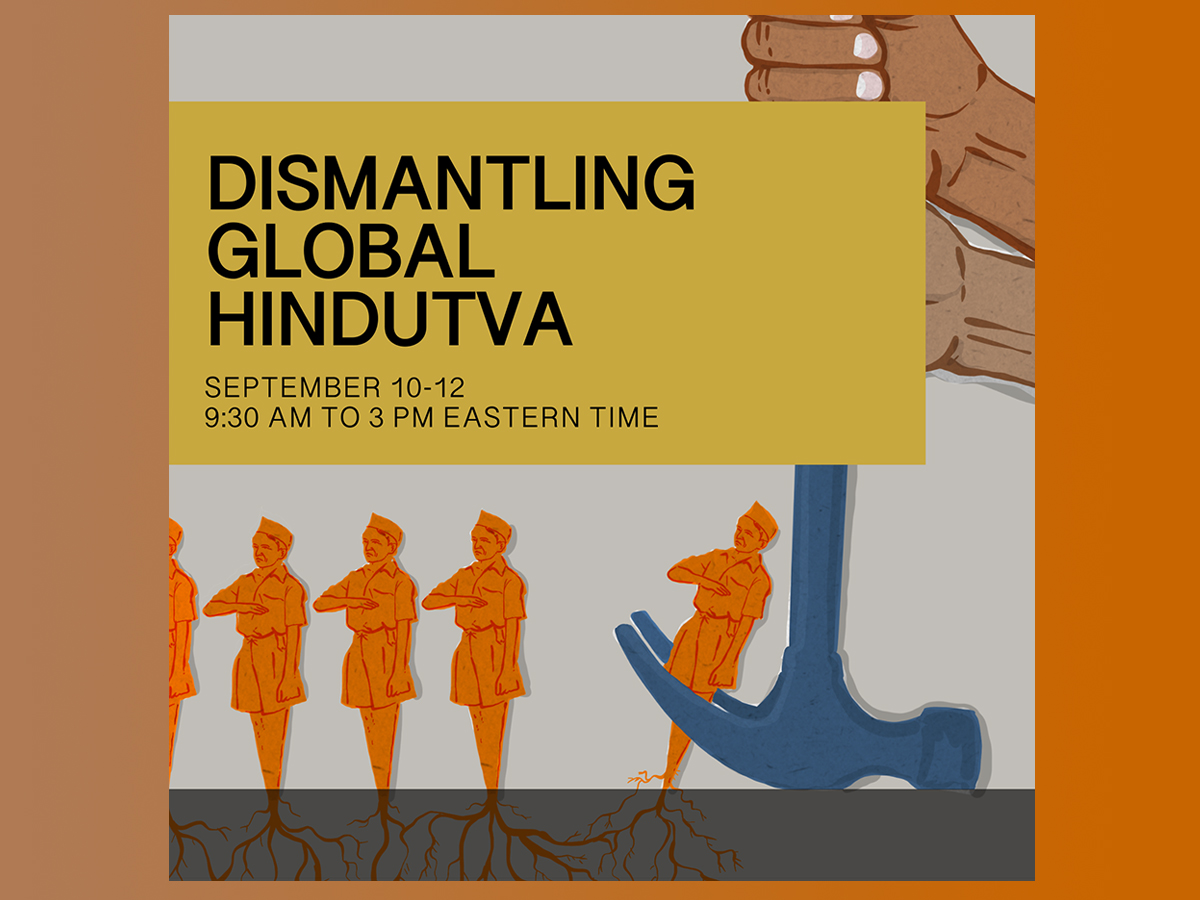
Poster for the Dismantling Global Hindutva conference. Courtesy image
(RNS) — Dismantling Global Hindutva, a virtual conference set to begin on Friday (Sept. 10), seeks to check what organizers claim is a far-right Hindu ideology that they believe is already undermining India’s secular and democratic traditions and threatening to stifle academic freedom in the U.S. and around the globe.
To its opponents, the conference is an exercise in Hinduphobia.
The event, which will continue through Sunday, will include nine panels, with topics such as “Caste and Hindutva” and “Islamophobia, White Supremacy and Hindutva.”
RELATED: Hinduphobia is a smokescreen for Hindu nationalists
Organizers say more than 50 groups representing journalists, activists and universities from the U.S. and Canada will take part, including Harvard, Princeton and the University of California.
The conference takes pains to make clear that the Hindu faith is distinct from Hindutva ideology.
According to Suhag Shukla, executive director of the Hindu American Foundation, which has condemned the conference, the term Hindutva still means different things to Hindus, from the spiritual to the political.
“Yet, by some activists, the term is being misused as a pejorative against the Indian and Hindu ways of life and is focused on political ideology,” said Shukla.
HAF and other Hindu American advocacy groups worry that the conference blurs the lines between legitimate criticism of India’s policies and anti-Hindu hate. Shukla compares the critiques of Hindutva to criticisms of Israel that veer into antisemitism.
“Hindutva” was first used in the 1890s by Bengali writer Chandranath Basu, who championed a strongly scripture-based, conservative Hinduism. A 1923 pamphlet, “Hindutva: Who Is a Hindu?” by Vinayak Damodar Savarkar, framed Hinduism as a political and cultural identity as well as a religious one. Since the mid-20th century, the chief proponent of this vision of Hindutva has been the Hindu nationalist group Rashtriya Swayamsevak Sangh, known as RSS or the Sangh, which has been banned repeatedly for hard-line militant activities throughout its history.
“Hindutva is not the same as Hinduism at all; Hindutva is an authoritarian and majoritarian ideology that insists that Hindus and Hinduism define India,” said Rohit Chopra, an associate professor of communication at Santa Clara University in California and one of the organizers of the conference. “In this view Muslims, Christians and members of other faiths are outsiders.”
In the seven years since Modi, a former member of RSS, has been prime minister, there has been a resurgence of Hindu nationalism, and minority groups have come under pressure, drawing criticism that he has a Hindutva agenda.
In recent years, debates over Hindutva have erupted among Hindu American communities, as Hindus in the United States and in India have defended or attacked Modi’s politics. In 2018, American academia became a battleground after Audrey Truschke, a historian of South Asia at Rutgers University, made what many Hindus call offensive comments about the depiction of deities from Hindu scripture. Truschke and other academics have received death threats in the ensuing social media tussle.
In April, Rutgers hosted an Understanding Hinduphobia conference, attended by the university’s president, that led the university’s student association to adopt a working definition of Hinduphobia.
In recent months, a group of academics who call themselves the South Asia Scholar Activist Collective and who include Truschke issued a “Hindutva Harassment Field Manual” aimed at helping academics fend off attacks on their scholarship. In response, other Hindu groups claimed the authors were attempting to silence academic freedom on campuses.
Now, organizers of the Dismantling Global Hindutva conference say they have been victims of a smear campaign.
“The internet is being used to silence critics of the Hindutva ideology who are involved in this conference,” said Chopra. “This has ranged from organized petitions to letter campaigns and petitions that claim falsely that this conference will lead to genocide. Some of those involved in the conference have received death and other vile threats.“
RELATED: Claiming the freedom to decide who is Hindu American
This article is produced by Religion News Service with support from the Guru Krupa Foundation.




